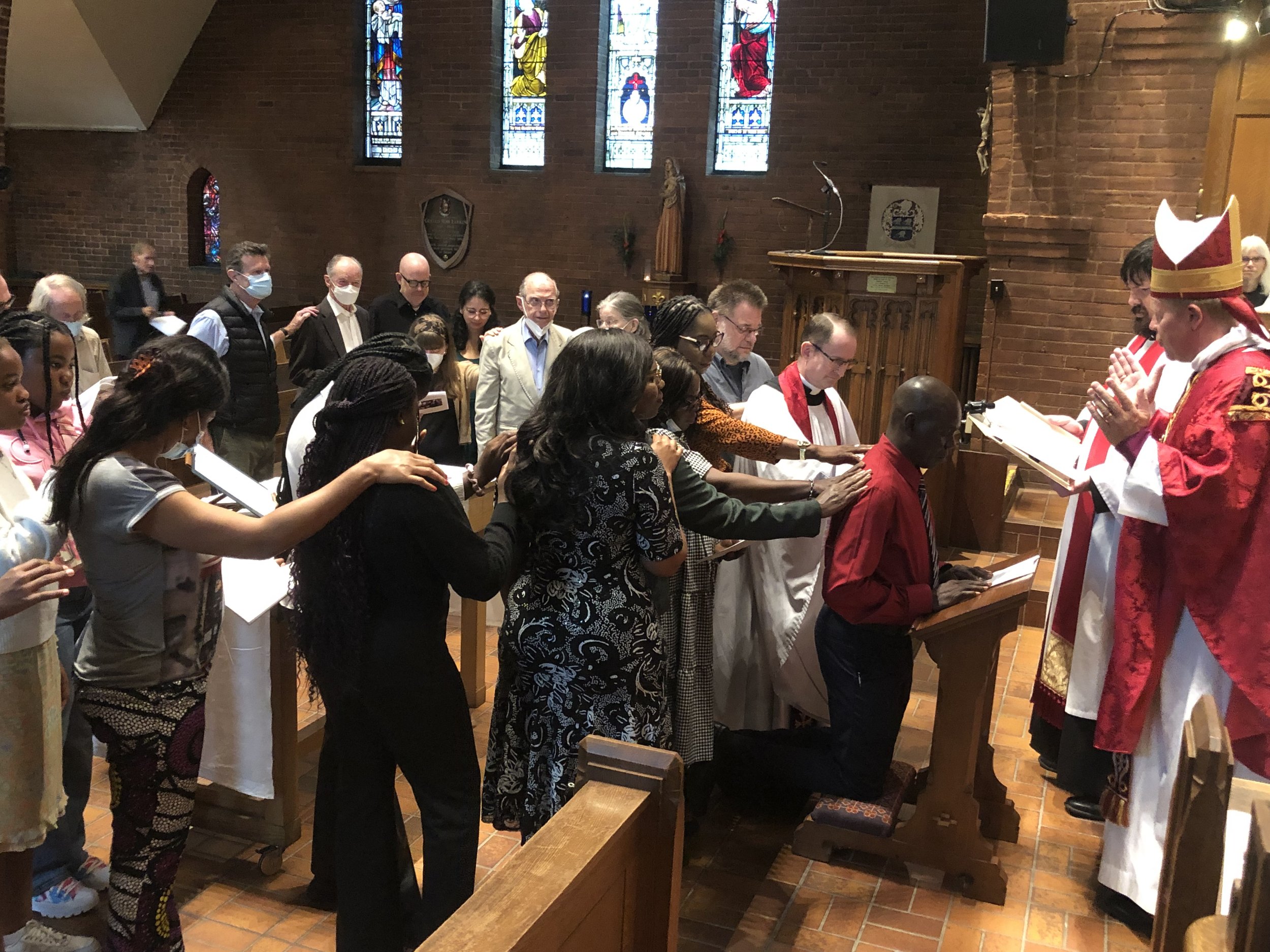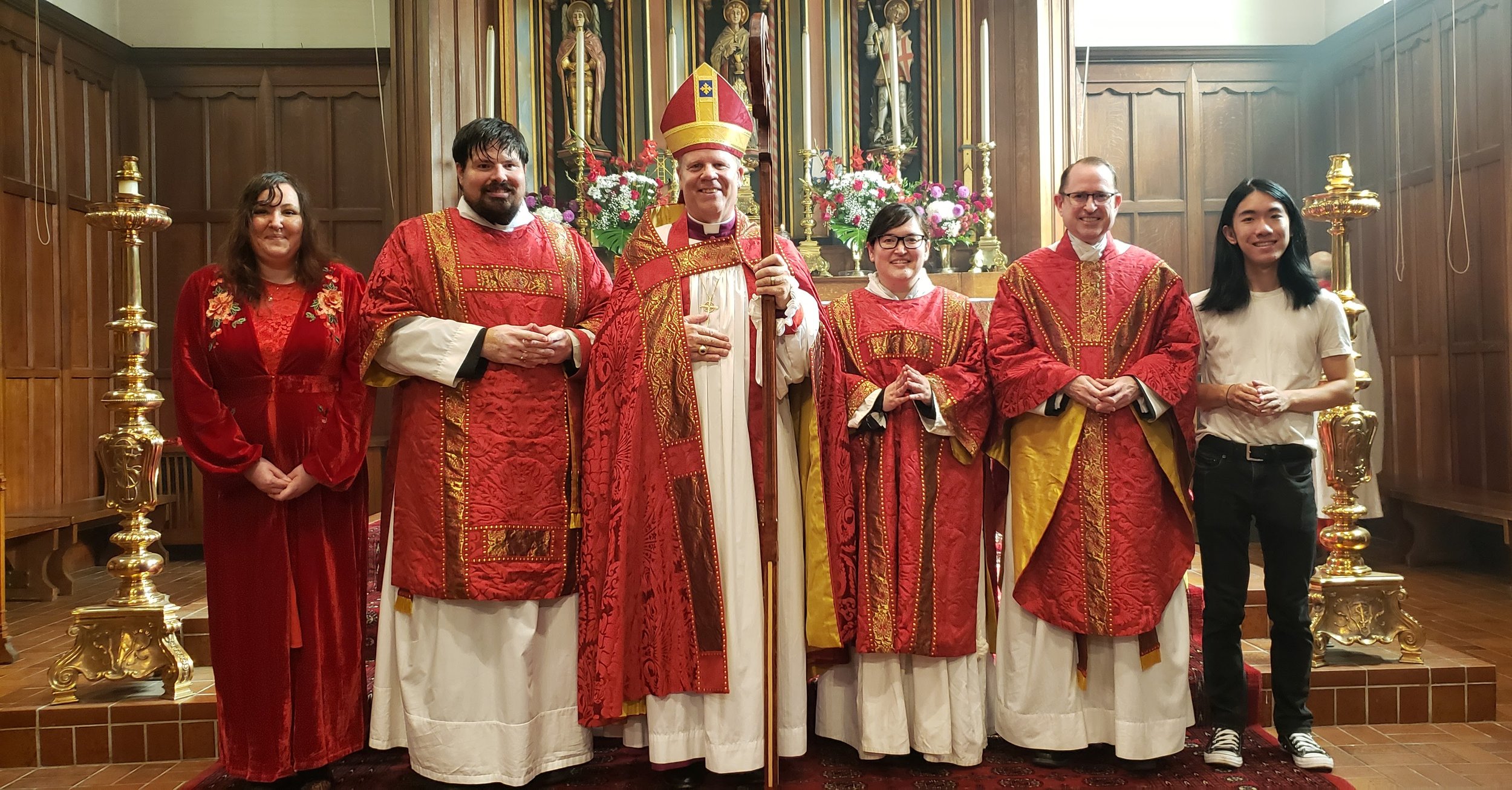Dear People, Neighbours, and Friends of St. Thomas’s,
It was a great joy to have Bp. Andrew Asbil and his wife, Mary, with us for the Sung Mass at 9:30 and High Mass at 11 this past Sunday, and to spend some time in fellowship with them in the parish hall after each service (see the “Parish Album” above). At the Sung Mass, every member of the congregation was invited forward to surround our confirmand, Bright Obazee, as the Bishop laid hands on him and anointed him. There was such a wonderful sense of unity. And the High Mass was a high water mark in my time here: over ninety people in church at that service alone! From Mattins through Evensong, we recorded a total of 204 people, some of whom, of course, attended multiple services and were counted two (or three, or four, or five times) and thus helped us pad our numbers, but I’m sorry to report that I was not one of them at Evensong. For when I returned to the rectory, no sooner had the sugar high of the cake from coffee hour worn off than I suddenly felt just flattened. I didn’t come down with The Plague (thank God), but I was stricken by something I hadn’t had in over two and a half years: the common head cold.
Sadly, when it comes to such things, I am far from resilient. Knowing that I had a wedding that coming Friday, I was determined to recover in time to preside at it without fearing that I would be contagious. Thankfully, my prayer was granted, and I was able to officiate at my first wedding in Canada for a lovely couple, both of whom hold doctorates in linguistics from the University of Toronto. The only problem was that I hadn’t had any energy to work on a homily, other than to scribble a few notes. But then a miracle occurred: As I sat at the sedilia listening to the first lesson, I realized that I could preach a linguistical homily! I recalled that the bride had shared that her second post-doc is focused on non-verbal gestures as linguistics, and I remembered that of the Five Love Languages that Dr. Gary Chapman enumerates, four of them are gestural. Only one, Words of Affirmation, is specifically verbal. The other four, Touch, Quality Time, Acts of Service, and Gifts, are gestures of love that we must learn to speak fluently if they aren’t our mother tongue already. While I’m not big on self-help gurus, I have found the Five Love Languages a helpful heuristic for discovering what makes other people feel loved, and how I myself feel loved. One thing I shared in the homily, for instance, is that of the five, the one love language that Anne and I don’t much care about when it comes to ourselves is gifts. But we know people for whom gifts are very important, so we have to be mindful about seeking out the right sort of gifts that convey our love to those for whom all the words of affirmation or acts of service aren’t heard or seen as what it means to be loved.
Thankfully, God speaks all five love languages fluently, and in Christ Jesus demonstrates God’s fluency to us on a daily basis. We just have to have ears to hear and eyes to see, hands to touch, and mouths to taste. And in our own Anglo-Catholic tradition, nothing says “I love you” like the smell of incense, a fragrant gift to God representing our prayers ascending to Heaven. How fluent are you in hearing and speaking God’s love languages? Are you seeking Christ’s healing touch? Are you sharing God’s time with each other? Are you engaging in acts of service empowered by the Spirit? Are you speaking in the tongues of mortals and angels with love? Are we willing to give as much as we are eager to receive? The share of our time, our talent, and our treasure that we give communicates who and what we really love: How eloquent is yours?
Yours in Christ’s service,
Fr. Nathan J.A. Humphrey
VIII Rector


